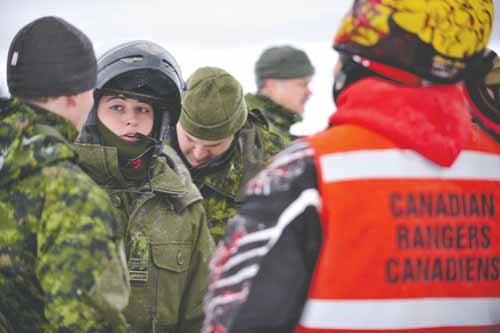Defending the sovereignty of the vast territory of the Canadian Arctic is perhaps one of the most overwhelming national security prospects on the planet.
And with climate change opening up the north as never before, the task may be more pertinent than ever. Since 1947 the task has fallen primarily on the shoulders of a group of a group of reservists known as the Canadian Rangers (sometimes mistakenly called the Arctic Rangers).
In 2008, the Government of Canada unveiled its new Canada First Defence Strategy (CFDS). The CFDS is a massive military recruitment and procurement program, part of which is to improve enforcement of Arctic sovereignty.
In addition to increasing enrolment in the Canadian Rangers, the government tasked the Canadian Army with creating the Arctic Response Company Group (ARCG), a company of reservists to provide support to the regular Forces, Rangers, Coast Guard and RCMP in Arctic missions.
At the end of February, 150 ARCG personnel were deployed at Prince Albert and Candle Lake for Exercise Arctic Bison 2013. The troops worked with the Rangers receiving training in winter survival, search and rescue, surveillance, and patrolling.
Sergeant Todd Appel, a regular army soldier with the 10th Field Regiment in Yorkton, was there, albeit somewhat reluctantly at first.
"It was better than I expected," he said. "I'm not a big fan of the cold, so I wasn't looking forward to it, but it was one of the best-run exercises I've ever been on and it wasn't that cold."
Appel said there are so many things to think about when conducting operations in a winter setting, simple things that could ultimately be life-saving.
Among the things the troops had time to learn and practice were: time management, such as recognizing it takes up to an hour and a half to thaw enough ice for cooking; carrying enough provisions to be self-reliant for several days at a time; pacing yourself so you don't get too cold or too warm; building improvised shelters; and allowing your outerwear to freeze dry by leaving it outside overnight."
"It's not something the average person thinks about, you never had to," Appel said.
He also found out that signal fires are "a lot more complicated than one might think and a lot more effective if you do it the way they teach it," he explained.
But the most important thing he learned was the criticality of maintaining gear.
"You have to rely on your machinery very much," he said. "If your snowmobiles are going down, for example, you're in a world of trouble."
Part of the training focussed on doing field repairs on equipment.
Lieutenant-Colonel Geoffrey Abthorpe, commanding officer of the entire exercise said the Prince Albert-Candle Lake setting provided a very realistic staging ground.
"Candle Lake is a fantastic location to hold this exercise," he said. "The scenario includes a broad range of tasks in winter conditions, and the ground matched our training requirements. In addition, the support the local community provided our exercise has been a major factor in its success, and on behalf of my soldiers, I sincerely thank our civilian hosts."
Appel also gave full credit to the Rangers.
"Working with the Rangers is always good, they're very knowledgeable and experts in survival, so no one better to learn from," he said.




